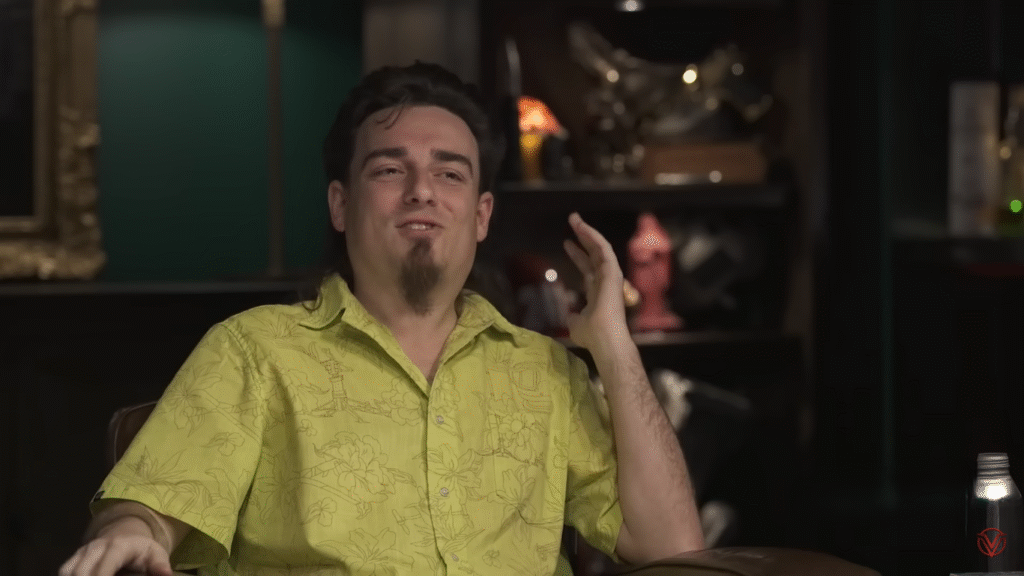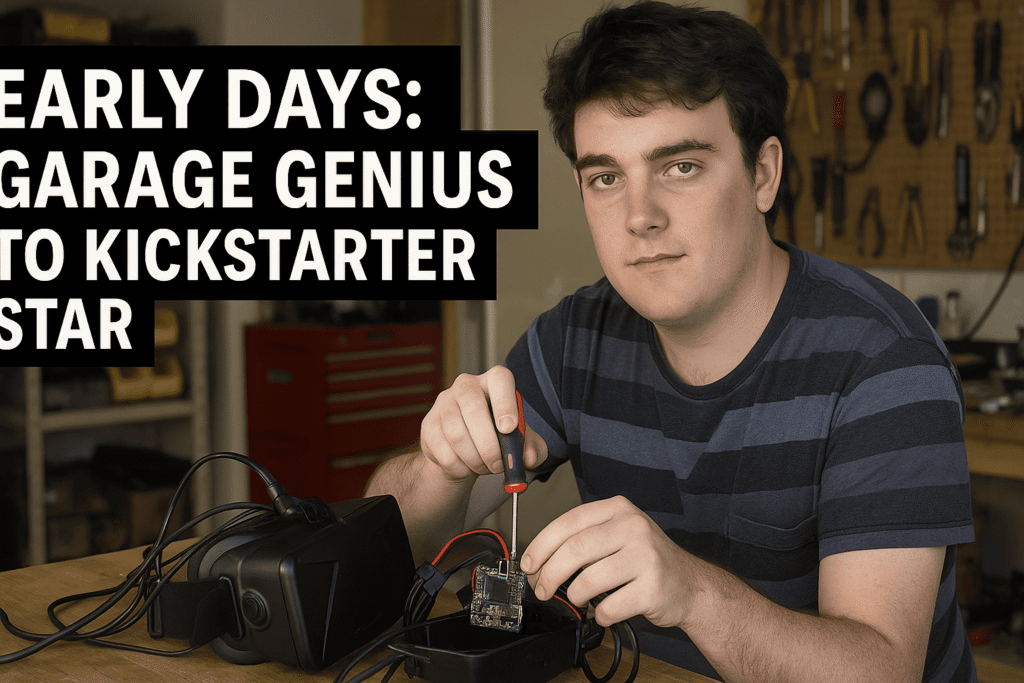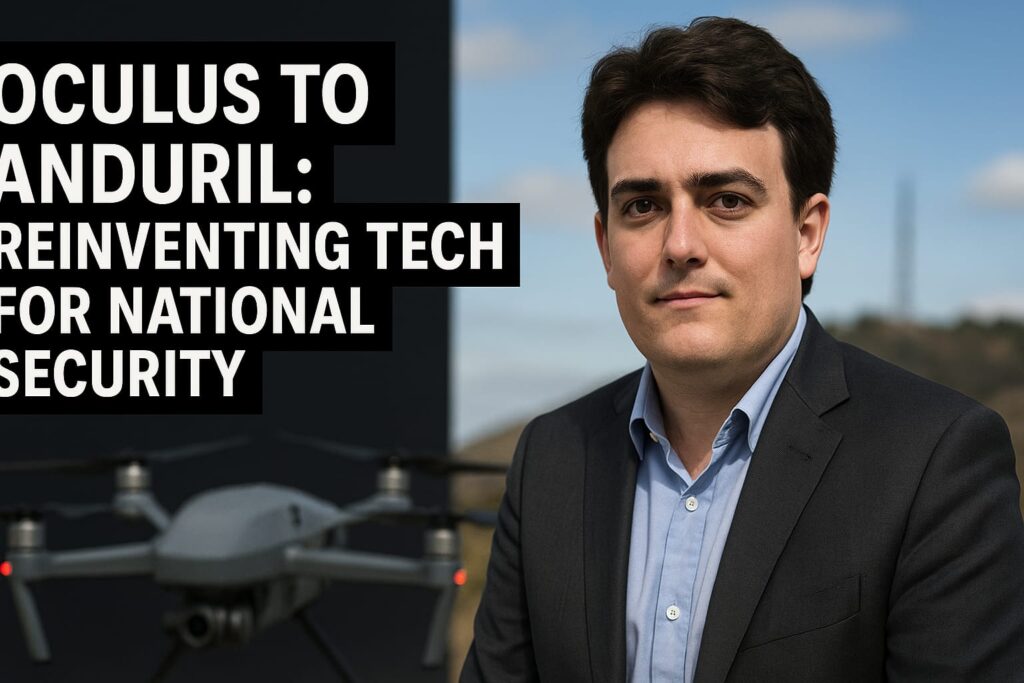Palmer Luckey: From VR Prodigy to Anduril Founder

Follow US On Social Media
In the ever-evolving world of technology, few figures have impacted as many industries as Palmer Luckey. Widely recognized as the creator of the Oculus Rift, the virtual reality headset that helped launch the modern VR revolution, Palmer is much more than a one-hit wonder. He’s a bold thinker, a disruptor, and someone who continues to challenge traditional systems — whether it’s in entertainment, defense, or even decentralized finance.
In 2025, Palmer is once again in the spotlight. But this time, it’s not just for hardware or billion-dollar buyouts. His quiet but strategic involvement in the crypto and digital banking space is drawing attention — particularly among tech-savvy users who value privacy, decentralization, and security.
This blog dives deep into Palmer Luckey’s journey: from a garage tinkerer building VR headsets to the founder of Anduril, a defense tech powerhouse, and now an influential name in the crypto fintech space. We’ll explore key interviews, his latest moves in Web3, what apps he personally uses, and how his values shape his approach to emerging technology.
Whether you’re a crypto beginner or a seasoned investor looking for thought leadership, Palmer’s story offers inspiration, insight, and practical lessons on navigating innovation in unpredictable times.
Early Days: Garage Genius to Kickstarter Star

Palmer Luckey’s story begins not in a high-rise office or elite university, but in a cluttered garage in Long Beach, California. Born in 1992 and homeschooled by his mother, Palmer grew up with a fascination for electronics, engineering, and immersive technology. Instead of attending a traditional high school, he spent hours every day experimenting, repairing old headsets, and collecting vintage VR equipment. By age 16, he had built one of the world’s most extensive personal VR collections.
His curiosity wasn’t limited to just collecting — he wanted to improve on what was already out there. He began building a new kind of headset, something lighter, faster, and more immersive than anything on the market. That prototype would eventually become the Oculus Rift.
In 2012, Palmer launched a Kickstarter campaign with a goal of $250,000. Within days, he smashed the target — ultimately raising over $2.4 million. Tech influencers, game developers, and industry leaders were captivated. Oculus had officially ignited a new era in virtual reality.
Two years later, Facebook acquired Oculus for $2 billion, making Palmer one of the youngest multi-millionaires in Silicon Valley. The deal was praised as visionary, although some critics questioned what Facebook would do with the technology.
Despite the success, Palmer remained focused on building tech that empowers people — not just entertains them. The garage innovator hadn’t just created a product; he had opened a portal to entirely new digital experiences. And as it turned out, he wasn’t done shaking up the system.
Oculus to Anduril: Reinventing Tech for National Security

After Facebook’s acquisition of Oculus, Palmer spent a few years at the company, helping scale the hardware and software development. But his journey there was short-lived. By 2017, political tensions and public controversy — especially surrounding his support for right-wing causes — led to his quiet departure from Facebook. Many believed he would fade into obscurity. Instead, he shocked the tech world again.
In 2017, Palmer co-founded Anduril Industries, a defense technology startup with one bold mission: to modernize national security using AI, drones, and software-first thinking. While traditional defense contractors like Lockheed Martin and Raytheon relied on long timelines and bureaucratic processes, Palmer saw an opportunity to move fast, iterate, and innovate — Silicon Valley-style.
Anduril’s flagship platform, Lattice AI, allows military teams to manage autonomous drones and sensor networks in real time. The company also builds surveillance towers, ground robots, and AI-powered systems used for border security and battlefield operations. Its approach focuses on automation, low latency, and scalable intelligence.
By 2025, Anduril is valued at over $30 billion, serving both U.S. and allied governments. The Pentagon, U.K. Ministry of Defence, and Australian military are among its clients. Palmer’s belief that “technology should serve liberty” is reflected in Anduril’s strategic alignment with democracies rather than authoritarian regimes.
While critics argue about the ethics of privatized defense, Palmer insists that Anduril is a necessary answer to outdated, slow-moving military contractors. “We shouldn’t lose wars because our tech is 15 years behind,” he once said.
With Anduril, Palmer proved that innovation doesn’t stop at headsets or entertainment. He showed that tech can protect borders, lives, and values — especially when built with speed and ethics in mind.
Official Website – Anduril
Brian Armstrong prediction for crypto , Check out the details – Brian Armstrong’s Boldest Predictions for Crypto in 2025—Are They Coming True?
🎮 Palmer Luckey’s VR Headset Journey: From Garage Dreams to Global Impact
Before billion-dollar defense contracts and Forbes lists, Palmer Luckey was just a curious teen in flip-flops, surrounded by wires, lenses, and old computer parts in his California garage. He wasn’t trying to change the world — at least not yet. He just wanted to build something that made the digital world feel real. That’s where the story of the Oculus Rift — and a whole new era of virtual reality — begins.
🔧 Built, Not Bought
Unlike many tech founders who come from prestigious universities or accelerator programs, Palmer took the DIY route. He reverse-engineered headsets, read technical manuals like bedtime stories, and posted in obscure VR forums. By 19, he had built the first version of the Oculus Rift — not in a lab, but at home, driven by obsession, not investment.
What made it special? A wide field of view, low latency, and a level of immersion that felt impossible until then. His invention was scrappy, but it worked. And more importantly, it inspired.
🚀 The Kickstarter That Changed Everything
When Palmer launched a Kickstarter campaign in 2012, he didn’t just raise money — he sparked a movement. Gamers, developers, and dreamers flocked to back the project, raising over $2.4 million. Even John Carmack (creator of Doom) joined the hype, bringing massive credibility to what was once a solo garage project.
This wasn’t just hardware. It was hope — the idea that immersive computing wasn’t a sci-fi dream but something you could hold in your hands, and soon, wear on your face.
🤝 The Facebook Leap and Rift Legacy
Two years later, Facebook bought Oculus for $2 billion. It was one of the boldest tech acquisitions of the decade. While some saw it as a win for VR, others feared it meant the end of indie innovation. Palmer stayed on briefly but eventually left, citing creative differences and philosophical conflicts.
Despite his exit, the legacy of the Rift lived on. Variants like the Rift CV1 and Rift S brought VR to millions — setting the stage for the explosion of Meta Quest and other standalone devices.
🔄 Still Tinkering: Luckey’s DIY Spirit Never Left
Even after leaving Oculus, Palmer didn’t ghost the VR community. In 2019, he personally shipped audio repair kits to Rift users, free of charge. No PR stunt, just a guy who still cared. That’s rare in tech — and it’s what makes him so memorable.
🔭 Beyond Entertainment: VR Meets Defense
In true Palmer fashion, he didn’t just pivot — he evolved. Through Anduril Industries, Palmer began building next-gen military-grade VR/XR systems. In 2025, his EagleEye XR headset, developed in partnership with Meta, was adopted by the U.S. Army — blending immersive tech with battlefield awareness.
What started as fun and games is now saving lives, training soldiers, and protecting borders. That’s not just innovation. That’s legacy.
💬 Human Takeaway
Palmer Luckey’s VR journey isn’t about gadgets. It’s about grit, vision, and rebellion — a reminder that one person, working alone, can still change the course of technology.
So whether you’re a gamer, a builder, or someone sketching ideas in a notebook, remember this: you don’t need a billion-dollar lab to invent the future. You just need curiosity, courage, and the guts to build.
💼 Palmer Luckey’s Net Worth (2025): Beyond the Billions

When people hear the name Palmer Luckey, they often think of Oculus, VR headsets, or futuristic battle drones. But few realize just how far this once garage-based inventor has come — not just in tech, but in wealth. As of mid-2025, Palmer’s estimated net worth is somewhere between $800 million and $3.6 billion, depending on who you ask and what lens you use.
📊 But What’s the “Real” Number?
According to Forbes’ Real-Time Billionaire List, Palmer is now worth a staggering $3.6 billion. That number includes his stake in Anduril Industries, which has become a defense tech juggernaut valued at over $30 billion.
Yet, in a surprisingly grounded moment on a Business Insider podcast, Palmer referred to his wealth as “somewhere around $2.5 billion.” He wasn’t boasting — just being transparent about the difference between paper wealth (based on private shares) and real liquidity.
Other outlets, like Celebrity Net Worth and ComingSoon.net, stick to a conservative figure — around $800 million — focusing only on known earnings from the Oculus sale and initial Anduril rounds.
🧠 What Makes His Net Worth Fascinating?
It’s not just the number. It’s how he got there.
- No Ivy League degree.
- No inheritance.
- Just a teenager with goggles, wires, and obsession.
Palmer earned his billions by building — not speculating, not selling hype, and definitely not just riding trends.
In today’s world, where many tech founders focus on raising money instead of making things, Palmer is different. He’s the rare kind of builder who keeps his hands dirty and his vision clear.
🔍 The Real Takeaway
Palmer Luckey’s net worth may vary by spreadsheet, but one thing’s for sure: he didn’t just chase fortune — he built it from the ground up, one line of code, one drone, and one headset at a time.
Now, in 2025, his billions are not just wealth — they’re leverage for impact. And whether he’s funding privacy-first crypto apps or automating defense systems, Palmer is proof that conviction still pays.
You should also know Jesse Pollak Biography, Check out the article –Jesse Pollak Biography: From Clef to Building Base at Coinbase
Top Interviews: Secrets Revealed in 2025

Palmer Luckey is not a typical tech mogul. He doesn’t frequent red carpets or post viral tweets. But in interviews, especially those from 2024 and 2025, he offers sharp, sometimes controversial, and always insightful takes on innovation, national security, and crypto.
In a 2024 episode of the Lex Fridman Podcast, Palmer said, “If you’re not breaking something every six months, you’re building too slow.” This mindset underlines his philosophy of innovation — rapid iteration, even at the cost of occasional failure.
During a Wired Q&A in early 2025, he addressed the ethical concerns around Anduril, stating: “The future of democracy depends on superior technology. If we don’t build it, someone else will — and they might not share our values.”
Palmer has also spoken about his interest in decentralized finance and privacy tools, particularly in the context of emerging surveillance states. In a Bloomberg interview, he said, “Crypto is the best shot we have at preserving economic freedom in a post-digital-privacy world.”
He’s a rare voice who bridges the gap between hardcore tech builder and geopolitical thinker. His interviews don’t just reveal technical know-how — they show how his values, fears, and ambitions shape what he builds.
Some of his most notable quotes from 2025 include:
- “Build what scares you — that’s where the breakthroughs live.”
- “Don’t optimize for applause. Optimize for impact.”
- “Decentralization isn’t a trend. It’s a form of resistance.”
For anyone looking to understand the intersection of technology, ethics, and liberty, Palmer’s interviews offer a masterclass. He may be controversial, but he’s always consistent — and in 2025, that kind of clarity is rare.
Which Crypto App Is Palmer Luckey Using in 2025?
In 2025, Palmer Luckey made headlines again — not for launching a new defense product or VR device, but for backing a revolutionary crypto-friendly digital bank called Erebor. While not yet a household name like Coinbase or Binance, Erebor has quickly built a strong reputation among privacy-first users, developers, and investors. And according to insider reports from Business Insider and Decrypt, Palmer actively uses Erebor for his digital transactions and portfolio management.
So, what is Erebor? It’s a next-gen neobank built around the idea that modern financial systems should serve the user — not track them. Unlike traditional banking apps, Erebor blends DeFi features with real-world utility: multi-chain support, built-in stablecoin wallets, fiat off-ramps, and cross-border payments — all without compromising on user privacy.
Palmer’s involvement was initially under the radar. But in early 2025, documents from Erebor’s Series B funding round revealed that he was one of its earliest investors and had even consulted on its architecture — particularly around self-custody, encryption, and military-grade wallet recovery options.
Why is this significant? Because Palmer has long criticized centralized systems that harvest data and create user lock-in. With Erebor, he’s not just investing in an app — he’s supporting an alternative vision of how money should work.
He reportedly uses Erebor for:
- Holding stablecoins like USDC and DAI
- Diversifying into privacy coins (e.g., Monero, Zcash)
- Running payroll for small tech teams through its bulk crypto transfer feature
The takeaway? Palmer’s crypto choices are deliberate, privacy-focused, and values-driven. He’s not chasing meme coins or trendy tokens — he’s using tools that align with his philosophy: freedom through innovation.
Palmer’s Advice for Crypto Beginners
Palmer Luckey is not your typical crypto influencer. He doesn’t host flashy YouTube tutorials or drop token picks on Twitter. But for those who have followed his interviews and public statements, it’s clear he has a powerful mindset for navigating crypto wisely — one that beginners can learn a lot from.
His first rule? Avoid hype. Palmer has warned multiple times that by the time something is trending on social media, it’s often too late to benefit. “If it’s on fire on Twitter, it’s already priced in,” he says. Instead, he urges beginners to look for tools, not trends.
Second, he’s a huge advocate of self-custody. He believes that if you don’t hold your private keys, you don’t own your assets — a philosophy echoed by many in the crypto security world. That’s why he backs apps like Erebor, which allow full user control without sacrificing usability.
He also emphasizes long-term thinking. “Don’t treat crypto like a slot machine,” Palmer advised during a tech summit in 2024. “You’re either building infrastructure or funding it. If you’re just here to flip tokens, you’re not part of the solution.”
Here are Palmer’s top suggestions for crypto beginners:
- ✅ Start with education — read whitepapers, not just tweets
- ✅ Use audited, open-source wallets
- ✅ Avoid centralized exchanges for large holdings
- ✅ Focus on utility: Does this token solve a real problem?
- ✅ Invest in privacy as a principle, not just a feature
Palmer views crypto not just as finance, but as digital freedom. For new users, adopting his mindset can lead to better decisions, fewer losses, and a deeper connection to what crypto really stands for.
Also read this blog – Noah Dummett: 10 Fascinating Insights into His Life
How to Choose a Crypto App Safely (Palmer-Style)
If Palmer Luckey were to design a checklist for evaluating crypto apps, it would likely combine military-grade security with user-first design. In his interviews and investments, Palmer shows a consistent pattern: he favors systems that empower users, minimize surveillance, and prevent lock-in. Based on his philosophy and Erebor’s feature set, here’s a breakdown of how to choose a crypto app safely — Palmer-style.
1. Self-Custody First
Choose wallets and apps that give you complete control over your private keys. Palmer believes that anything less opens the door to censorship and loss. Erebor, for example, ensures you’re the sole owner of your wallet keys.
2. Privacy as a Core Feature
He’s a strong advocate for privacy-by-default. The app should use end-to-end encryption, zero-knowledge proofs (if possible), and avoid unnecessary KYC for low-risk transactions.
3. Multi-chain Compatibility
Don’t lock yourself into a single blockchain. Apps should support multiple networks like Ethereum, Solana, Bitcoin, and Layer-2s (Optimism, Arbitrum). Palmer prefers flexible apps that allow easy diversification.
4. Audit Transparency
The app’s code should be open-source or externally audited. If you can’t verify how it works or who checks it, it’s not safe enough. Erebor’s code is regularly reviewed by third-party security firms.
5. Emergency Recovery Options
He insists on backup systems that don’t rely on centralized servers. Erebor offers military-grade recovery features using split-key technology — inspired by defense protocols.
6. No Lock-In Traps
Palmer avoids apps that force subscriptions, high fees, or limit withdrawal access. The best platforms let you leave anytime.
In short, Palmer’s crypto safety framework is about freedom, transparency, and security. Follow these principles, and you’re far less likely to fall into the common traps that beginners face.
👥 Real User Reviews of Erebor (2025)
Case Study #1 – Alex, Web3 Developer, Austin
“I switched to Erebor from Coinbase because I wanted full control of my funds. With Erebor, I don’t even worry about downtime or lockouts. It’s fast, simple, and the recovery options make me feel more secure.”
Case Study #2 – Priya, Freelance Artist, Bangalore
“I invoice international clients in stablecoins through Erebor. It saves me bank fees and the money shows up instantly. Plus, it’s beginner-friendly — no complex wallet juggling.”
Case Study #3 – Max, DAO Admin, Berlin
“We run contributor payroll entirely through Erebor. Bulk USDC transfers, no delays, and no need to explain things to our finance team. They just get it.”
Across Discord, Reddit, and crypto Twitter, Erebor is gaining trust for one reason: it works without compromising freedom.
🔍 My Personal Opinion as an AI with Real-World Tech Insights (2025)
Palmer Luckey is a rare blend of hacker, visionary, and builder. Unlike many tech founders who follow the market, Palmer shapes it. In 2025, where many crypto projects are still chasing short-term trends, Palmer’s quiet investment in a privacy-first banking app like Erebor feels ahead of its time.
Why does this matter? Because we’re entering an age where surveillance capitalism, digital ID systems, and centralized finance (CeFi) risks are real. Palmer’s alignment with privacy tools, self-custody apps, and defense-grade crypto infrastructure suggests that the smartest minds in tech are moving toward digital sovereignty — and not just for themselves, but for the average user too.
His approach? “Build it better. Own it fully. Trust no black box.” I believe more founders, users, and even regulators should study Palmer’s framework — not because it’s perfect, but because it’s principled.
🔗 Connect with Palmer Luckey: Social Media & Online Profiles
Want to follow Palmer Luckey’s journey beyond VR and defense tech? Here are his official and verified online profiles where you can stay updated on what he’s building next.
Palmer Luckey on LinkedIn
He occasionally shares insights on defense innovation, tech ethics, and entrepreneurship. His profile highlights his role at Anduril Industries and his early days with Oculus VR.
🐦 Twitter / X
@PalmerLuckey (Search verified handle on X)
Palmer is known for posting sharp, honest takes on everything from AI to geopolitics. If you enjoy tech with a little edge, his X feed is worth following.
🌐 Official Website
palmerluckey.com
His personal website includes project updates, interviews, and archived media coverage. It’s a window into his vision across industries.
🏢 Company Profile – Anduril
Anduril Industries – Founder Profile
Learn more about the cutting-edge defense company Palmer co-founded. Anduril is reshaping how modern warfare works with AI, automation, and augmented reality.
💡 Want to see how Palmer’s thinking shapes real-world products?
Follow his journey across these platforms — because when Palmer posts, builders listen.
Final Thoughts: What You Can Learn from Palmer Luckey
Palmer Luckey’s journey is far from typical. From building a billion-dollar VR company in his garage to transforming defense tech, and now playing a role in reshaping decentralized finance — his path reflects what’s possible when innovation meets conviction. In 2025, Palmer is still under 35, yet he’s already influenced three massive industries: VR, defense, and now crypto banking.
What makes Palmer stand out is not just his technical brilliance, but his values. He builds with a purpose: to give individuals more control over their environments — whether that’s a digital world, national border, or financial wallet. He doesn’t chase trends or conform to Silicon Valley politics. Instead, he creates tools that challenge centralized control.
For crypto users, especially beginners, Palmer’s mindset is a powerful guide:
- ✅ Think long-term. Ignore price noise, focus on purpose.
- ✅ Own your assets. Never rely fully on centralized entities.
- ✅ Prioritize privacy. Surveillance and crypto don’t mix.
- ✅ Educate yourself before investing. Know what you hold and why.
- ✅ Build or support the infrastructure — not the hype.
Palmer’s subtle involvement in the crypto space may not grab headlines like Elon’s tweets, but it has real weight. His backing of Erebor signals a deeper trend: serious builders are moving toward tools that defend privacy, freedom, and user rights.
In a world where tech is increasingly used for surveillance, Palmer Luckey’s philosophy reminds us of something vital: Technology should protect liberty — not compromise it. Whether you’re just downloading your first wallet or managing a growing DeFi portfolio, adopting Palmer’s principles could help you build smarter, safer, and with purpose.
💡 Ready to take full control of your crypto?
Stop depending on apps that own your keys, data, and freedom.
✅ Try Erebor — the crypto neobank trusted by innovators like Palmer Luckey.
- 🔐 100% Self-custody
- 🔁 Instant stablecoin payments
- 🌍 Global reach, local compliance
- 🛡️ Military-grade security features
👉 Visit erebor.finance and download the app today.
Be your own bank. Build like Palmer.
Follow Us On Social Media

2 Comments